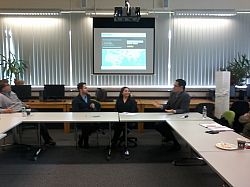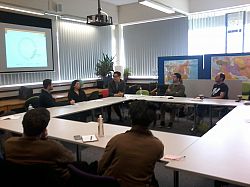
The Sussex Asia Centre hosted an event on Corruption and Integrity Building in Central Asia and Beyond on March 30th. The speakers included Diana Ibanez Tirado (Sussex/SOAS), Till Mostwolansky (Bern), and Fredrik Galtung (Integrity Action).
Dr Ibañez-Tirado opened the proceedings and examined ethnographically the project of Roghun Dam and Hydropower Station in Tajikistan. She argued that in Kulob, southern Tajikistan, people differentiate between practices of objectionable corruption and more benevolent forms of bribing/cunning. The evaluations about what constitute ‘good’ and ‘bad’ forms of bribes are made by Kulob residents in terms of their understandings of how such practices interact with notions of piety and the leading of a Muslim life and also more pragmatic concerns: cunning, and therefore asking and taking bribes, is regarded, given the harsh circumstances of daily life as being a morally neutral way of achieving immediate goals.
Dr Mostowlansky presented two comparative ethnographic studies of corruption-related issues in Tajikistan: one located in the setting of eastern Pamirs (Murghab) involving the illegal import of vehicles, and the second case-study located on the western tip of Tajikistan addressed the role played by bribes in the health sector. In Murghob, Mostowlansky argued, residents ‘legalise’ imported cars by giving small bribes to state-officials, yet this practice was seen as being important to the maintenance of social harmony. In the context of Tursunzoda, however, “corruption” is associated with the activities of distant state institutions whereas the everyday giving of bribes regarded as important element of doctor-patient relationships.
Fredrik Galtung discussed the approach that Integrity Action has developed in the anti-corruption sector. He gave examples of diverse projects that have been applied by Integrity International – such as rubbish collection in Naryn, Kyrgysztan, school building in Afghanistan, and infrastructure projects in Palestine. Mr Galtung emphasised the critically important role that local people played in defining the nature and direction of the projects pursued by Integrity Action. He also emphasised the important role that ethnographic knowledge and methods could play in the activities of policy-making organisations such as his own.
The Sussex Asia Centre hopes to arrange a future event exploring potential further collaborations between scholars working on corruption in Asia contexts and policy makers and organisations, including, Integrity Action, active in this domain.
http://www.integrityaction.org/
http://www.sussex.ac.uk/sussexasiacentre/index
Follow us on Facebook: Sussex AsiaCentre
Diana Ibañez-Tirado
Magnus Marsden

